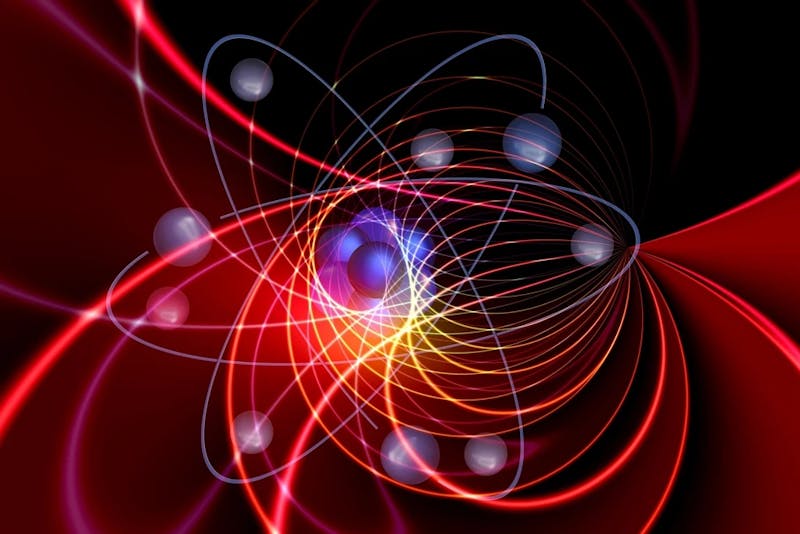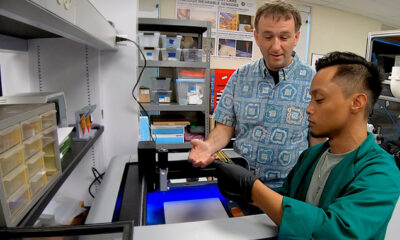Science
Nobel Prize in Physics 2025 Honors Breakthroughs in Quantum Science

The 2025 Nobel Prize in Physics has been awarded to John Clarke from the University of California, Berkeley, along with Michel H. Devoret from Yale University and John M. Martinis from the University of California, Santa Barbara. Their groundbreaking work on “the discovery of macroscopic quantum mechanical tunneling and energy quantisation in an electric circuit” marks a significant advancement in the field of quantum science.
This year’s award coincides with the International Year of Quantum Science and Technology, celebrating a century since the inception of modern quantum mechanics. The laureates’ research sheds light on fundamental principles that could revolutionize various technological sectors.
Understanding quantum mechanical tunneling requires a grasp of quantum behavior, where particles are not fixed points but exist as probabilities in specific locations. According to Schrödinger’s equation, there is a chance that a particle can traverse a barrier, even when lacking sufficient energy. This phenomenon allows particles to seemingly pass through barriers, akin to walking through a wall—an impossibility in the classical world.
Advancements in Quantum Technology
The discovery recognized by this Nobel Prize builds upon earlier research that was awarded in 1973 for the tunneling of individual particles. While significant, that work focused primarily on microscopic applications, limiting its broader impact. The current laureates’ contributions, published in 1985, expanded this understanding to include collections of particles, specifically currents comprising millions of electrons. This macroscopic perspective opens new avenues for practical applications in technology.
The implications of this research are vast. Quantum computers, known for executing complex calculations in moments, stand to benefit immensely from enhancements in quantum tunneling of currents. Furthermore, potential applications extend into quantum cryptography, which promises highly secure communications, and quantum simulations, crucial for modeling complex systems in medicine, chemistry, and biology. Industries ranging from semiconductor production to financial services may see substantial demand for these technologies.
In light of these advancements, a new era of innovation driven by quantum mechanics is on the horizon. The implications could lead to improvements not only in computational power but also in the security and efficiency of various technological systems.
Community Reactions and Future Outlook
The excitement surrounding the award was palpable among students and scholars. Physics major Peter Seelman from the Whiting School of Engineering expressed his enthusiasm in an email to The News-Letter. “Having just given a presentation on the math behind the prize for a physics class, it still feels like magic, but it’s justified magic,” he shared. He praised the laureates for demonstrating quantum phenomena in a format accessible enough to be held in one’s hand, emphasizing the profound nature of physics as a study of the universe’s underlying magic.
As the field of quantum science progresses, the recognition of Clarke, Devoret, and Martinis serves as a reminder of the extraordinary potential held within this complex realm. The ongoing exploration of quantum mechanics not only enriches our understanding of the universe but also promises to transform technology and society in unprecedented ways. The future of quantum science appears bright, with new discoveries poised to redefine what is possible.
-

 Science3 months ago
Science3 months agoUniversity of Hawaiʻi Joins $25.6M AI Project to Monitor Disasters
-

 Business3 months ago
Business3 months agoForeign Inflows into Japan Stocks Surge to ¥1.34 Trillion
-

 Entertainment2 months ago
Entertainment2 months agoHudson Williams Gains Popularity as Breakout Star on Heated Rivalry
-

 World3 months ago
World3 months agoBoeing’s Merger with McDonnell Douglas: A Strategic Move Explained
-

 Science2 months ago
Science2 months ago$1.25M Grant Advances Hawaiʻi’s Real-Time Hazard Monitoring
-

 Entertainment3 months ago
Entertainment3 months agoSydney Sweeney Embraces Body Positivity Amid Hollywood Challenges
-

 Top Stories3 months ago
Top Stories3 months agoBOYNEXTDOOR’s Jaehyun Faces Backlash Amid BTS-TWICE Controversy
-

 Top Stories3 months ago
Top Stories3 months agoUrgent Farewell: Joleen Chaney Leaves Legacy at KFOR
-

 World3 months ago
World3 months agoFrench Film Explores Group Therapy in ‘Group – The Schopenhauer Project’
-

 Top Stories3 months ago
Top Stories3 months agoMarc Buoniconti’s Legacy: 40 Years Later, Lives Transformed
-

 Lifestyle4 months ago
Lifestyle4 months agoKelsea Ballerini Launches ‘Burn the Baggage’ Candle with Ranger Station
-

 Top Stories3 months ago
Top Stories3 months agoCarson Wentz Out for Season After Shoulder Surgery: Urgent Update









